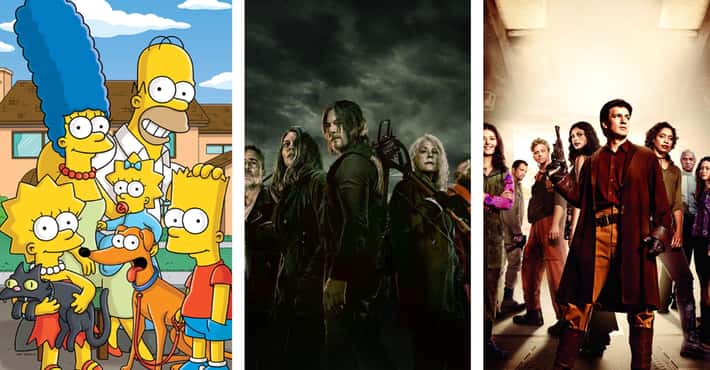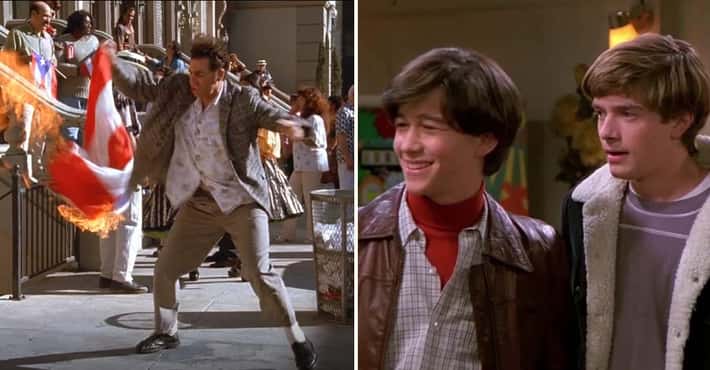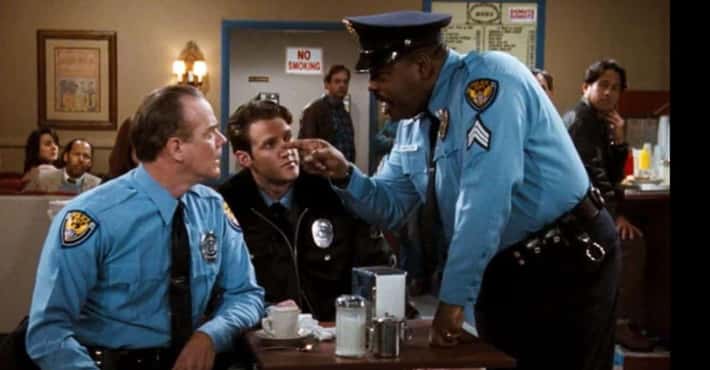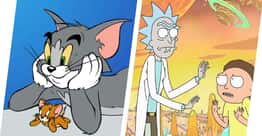'Silent' - Or No Dialogue - Episodes That Were Arguably Better Than The Rest Of The Show
Copy link
Vote up your favorite silent episodes of television.
- 1405 VOTES
When Buffy the Vampire Slayer creator Joss Whedon was praised for the show's quippy dialogue, he challenged himself to write an episode with none. It is then he created the concept of “The Gentlemen,” monsters that steal the town's voices so that they can't scream when they take their hearts.
Though “Hush” has about 17 minutes of speech, the rest of the episode plays with techniques established in silent movies, including subtitles and pantomime. This would not be the first time the show used sound to make riveting television, as the show would go on to make a musical episode and one without a score. ‘Hush’ is the only episode of Buffy to be nominated for an Emmy Award for Writing in a Drama Series.
- 2119 VOTES
How do we maintain our manners and humanity in a fully automated world? That is the question at the heart of the X-Files Season 11 episode “Rm9sbG93ZXJz.” In it, Mulder and Scully dine out at a fully robotic sushi restaurant, run by AI. As they eat and scroll through their phones, a series of sinister events is started when the wrong food is delivered.
As Vox critic Emily St.James pointed out, the episode portrays a very realistic and grounded robot uprising:
It’s a scenario far closer to how AI might eventually exterminate us. Understanding only a small facet of human interaction, it can’t comprehend when we break from that programming and do something else; and thus, it makes a decision that seems logical to it and horrifying to us, like turning all of our smart devices and other robotic pals against a pair of bad tippers.
- 3120 VOTES
A woman primitively living by herself in the middle of nowhere with no modern amenities finds herself attacked by a group of aliens in this episode of The Twilight Zone. The unnamed woman (played by Bewitched's Agnes Moorehead) often cries out and sighs in pain, but she speaks no dialogue.
As Jonathan Bignell points out in Sound/Image: Moments in Television, Moorehead's performance is vital to the episode:
Sounds produced by her vocally, by her body movement and as a result of actions she initiates, as well as sounds coming from alien invaders and their technologies, carry an extraordinary weight because of the lack of other kinds of audio information.
This would not be the only Twilight Zone episode that plays with silence and lack of dialogue. In Season 3's “Once Upon a Time,” the show plays homage to the silent film with an episode starring silent legend Buster Keaton. However, the middle third of the story features heavy dialogue and thus is not included on this list. It is cool to see Keaton talk, though.
For a little over thirty minutes, Only Murders in the Building showed us the perspective of one of its most complex characters, Theo (James Caverly) in the Season 1 episode “The Boy from 6B.” Heir to the Dimas dip empire and a major player in the death of Zoe Cassidy, he seems to hold all the answers in Charles (Steve Martin), Mabel (Selena Gomez), and Oliver's (Martin Short) quest to find out who killed Tim Kono.
Because Theo is deaf, the entire episode uses about one line of dialogue, choosing instead to tell the story visually. Text messages, sign language, and flashbacks were used to bring the viewer into Theo's world.
Cherien Dabis, the director of the episode, told Salon that they were tasked with presenting Theo's storyline differently visually from the rest of the series as well, so deaf watchers could tell the difference between his and the main story:
"How will they see the difference between the point of view of Theo versus the trio?” And it was a really great question that challenged me to find a visual language for differentiating those two storylines.
- 5120 VOTES
Bluey is easily one of the best TV shows out there for both parents and young kids. “Rain” is a prime example of that, as its 8-minute runtime contains very little dialogue. It still can hold a 4-year-old's attention. We watch as the titular dog plays in the pouring rain, making a dam with the runoff water.
As she tries different materials to stop the stream, from toy blocks to newspapers to umbrellas, she keeps tracking mud into her house, much to her mother's dismay. As a parent, her journey in the episode is relatable to many who have kids, and is considered one of the best episodes for new parents to watch.
- 6124 VOTES
One of the best ways to get an audience to empathize with a subject is to bring them into their world. In the sixth episode of Dahmer, we literally see the entire life of Tony Hughes (Rodney Burford), a Black gay man who is deaf. From his birth to his brutal and untimely (and ultimately unseen) death at the hands of a cannibalistic serial killer, we see the full scale of a victim's life beyond their infamous end.
With very little dialogue and muffled sounds, the writers show us not only how Tony moved in the world but how he was more than just a headline. While the show brought into question if the Jeffrey Dahmer story needed retelling, critics praised the episode and Rodney Burford's performance.
- 7108 VOTES
Netflix's anthropomorphic take on Hollywood through the eyes of an aging and washed-out sitcom horse gets the silent treatment in the episode “Fish Out of Water.” While not aptly titled (it should be called “A Horse Off of Land”), it follows Bojack as he attends an underwater film festival and is unable to speak with most people due to wearing a helmet.
A stand-alone episode about regret and missed chances, the episode's animators rely on music, color, and unintelligible fish languages to get their point across. Many early animations relied on dialogue-less scripts, so Bojack Horseman's creative team pulled inspiration from Looney Tunes and Who Framed Roger Rabbit.
“This episode is really tied into the history of animation in a nice way,” production designer Lisa Hanawalt told Vox.
- 864 VOTES
It's not very often, if ever, that a Christmas episode is the silent episode. For Mr. Robot, the concepts go hand in hand. It follows computer hackers and anarchist siblings Elliot and Darlene as they execute a heist at a computer server farm on Christmas day.
The pair communicate much of the episode through text messages, which is reflective of their icy relationship state at this point in the show. Upon realizing that the two characters had to be “very quiet,” creator Sam Esmail wove the silent treatment into the fabric of the story. He also found a bigger message within the episode, as he told The Hollywood Reporter:
In this day and age, as we’re leaning into tech — and of course, our show revolves around tech — a lot of people text and don’t call each other. It leans into the isolationism that can be a consequence of technology. For a lot of reasons, we thought that really worked for this episode.
- 942 VOTES
77 Sunset Strip may not be a household name now, but the detective show was groundbreaking in 1958 when it premiered. It paved the way for the TV franchise, with three spinoffs eventually airing.
In 1960, “The Silent Caper” is the first time a no-dialogue episode aired ever on television. It was written by its star Roger Smith and followed lead detective Jeff's attempt to rescue a kidnapped stripper before a mob trial.
According to Lynn Speigel's book TV by Design, the episode inspired other shows of the era to use, or partially use, the narrative device.
- 1066 VOTES
“S is for Silence” starts out with its three leads of supernatural investigators, knocking on the door of a sacred monastery. They are soon directed to a sign saying that no one had spoken on its grounds for over 130 years and that talking is prohibited. Thus begins the silent episode of Evil.
Relying less on music, the episode blends horror and physical comedy as the group gets split up early. The director of the episode, Robert King, told Vanity Fair that the lack of dialogue allowed the actors to improv more:
I would say this was our most spontaneous [episode], partly because the actors didn’t have to talk. I could talk to them off camera and we would take that dialogue out. So I could say, if I liked something [an actor] was doing, “Go further, go further.” It must have been in the way silent directors could do it.

































